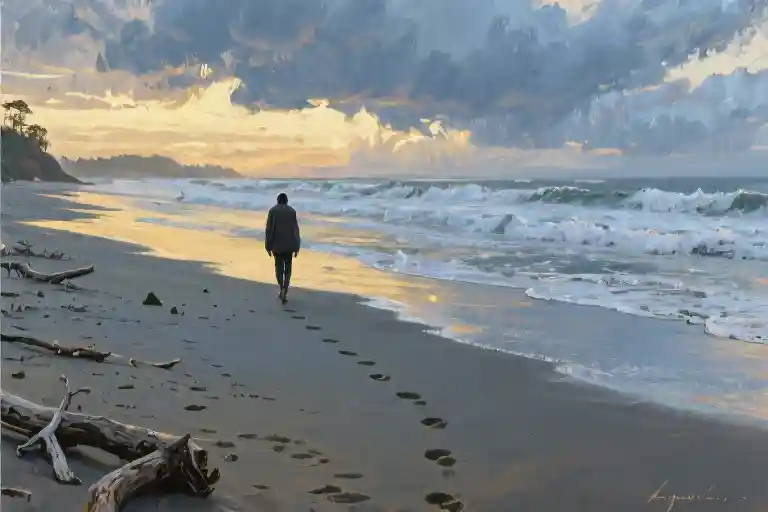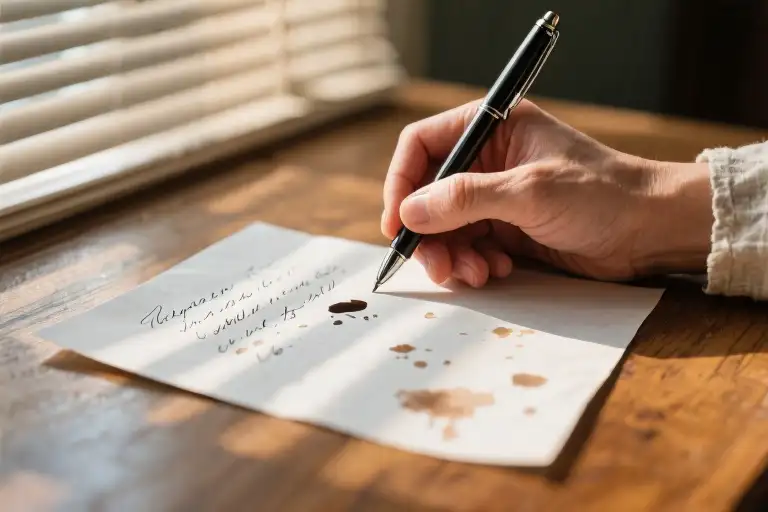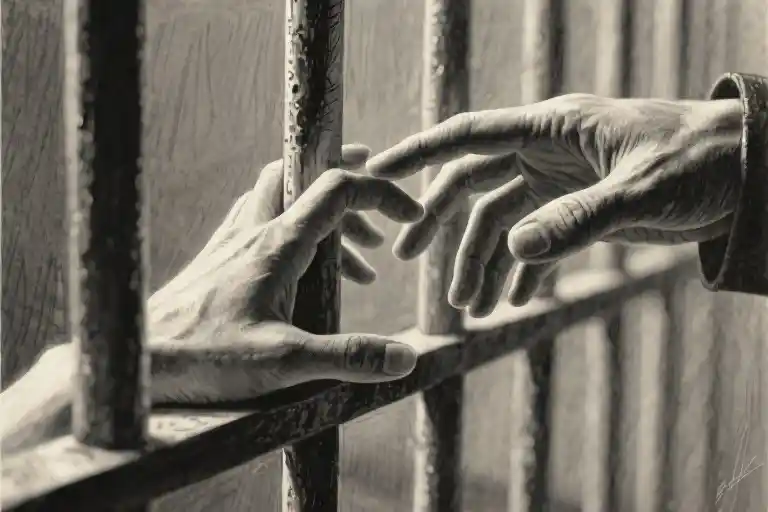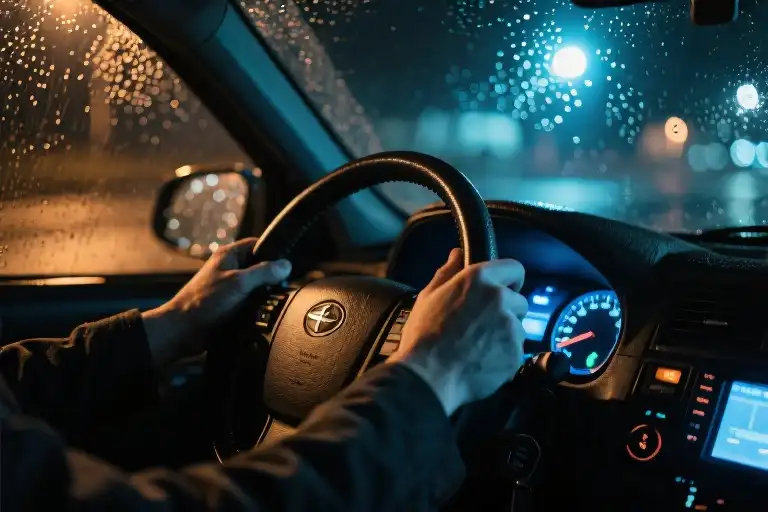1996 was one of those years that splits your life into ‘before’ and ‘after.’ By August, two seismic truths had reshaped my world: I was facing prison time for manufacturing drugs, and at 27 years old, I’d just discovered I was adopted. The kind of revelations that make you stare at your hands wondering whose life you’ve been living.
That summer smelled like photocopied court documents and the pine air freshener dangling from my rearview mirror. Every morning I’d wake up with two competing thoughts: the federal sentencing guidelines spreadsheet my lawyer kept updating, and the baby photo my adoptive mother had finally given me – a wrinkled snapshot with ‘Portland, 1969’ written on the back in fading ink.
Then came the phone call that changed everything. A woman’s voice, trembling slightly: ‘I think… I might be your birth mother.’ Three weeks later, I was holding an envelope containing plane tickets to Oregon, where a family I’d never met was waiting to share their beach house with me. The irony wasn’t lost on me – preparing to meet biological siblings while simultaneously packing what might as well have been a prison go-bag.
What stays with me now isn’t the legal paperwork or even that first awkward hug at the airport. It’s the surreal contrast of those days – how the cold Pacific wind carried laughter from strangers’ barbecues while I mentally calculated how many more sunsets I’d see before my sentencing. How the sand kept slipping through my fingers no matter how tightly I clenched them, like the time that was draining away.
This is where most adoption reunion stories end – the joyful homecoming, the tearful reconciliation. But mine had an expiration date stamped on it, and we all knew it. That beach house became the eye of my hurricane, a temporary shelter where I could almost pretend the coming storm didn’t exist. Almost.
The scent of saltwater and fir trees still takes me back to Neskowin Beach, to that suspended moment between who I’d been and who I might become. Between the family I’d just found and the freedom I was about to lose. What no one tells you about finding your biological family as an adult is that it doesn’t erase your past – it just gives you new lenses to see it through.
The Twin Bombshells
The revelation came on an ordinary Tuesday afternoon. My adoptive mother – the only mother I’d ever known – sat me down with trembling hands. “There’s something you need to know,” she began, her voice carrying a weight I’d never heard before. At 27 years old, I discovered I was adopted. The framed baby pictures on our walls, the childhood stories repeated at holidays, even the medical history I’d recited to doctors – none of it was biologically mine.
The Adoption Disclosure
She showed me the paperwork: a closed adoption finalized three days after my birth. The details were sparse – no names, just the cold bureaucratic language of the state adoption system. I remember running my fingers over the notary seal, as if the raised ink could make it more real. The woman who’d raised me suddenly became both everything and not enough – my mother, yet not my mother.
The Legal Storm
This personal earthquake hit just as the ground was already shaking beneath me. Earlier that year, law enforcement had raided my apartment. The manufacturing charges carried mandatory prison time – a reality I’d been trying to outrun through plea deals and legal maneuvers. Now I faced two simultaneous identity crises: the criminal label the justice system would impose, and this new uncertainty about my very origins.
Psychological Whiplash
The cognitive dissonance was overwhelming. I’d spend mornings reviewing prison prep lists with my attorney, then afternoons staring at my reflection searching for unfamiliar features. My hands became objects of fascination – were these fingers that had measured illegal substances the same hands that carried some stranger’s DNA? The question haunted me: if I wasn’t who I thought, could I still become who I wanted to be?
The Double Countdown
Two timelines began racing:
- The sentencing date creeping closer on the calendar
- The urgent need to uncover my biological truth before incarceration
Court documents piled up alongside newly requested adoption records. The sterile language of legal briefs contrasted sharply with the emotional handwriting of my biological mother’s first letter when she found me that June. After twenty-seven years of silence, our stories were about to collide at the worst and best possible time.
The Core Duality
This chapter of my life became defined by opposing truths:
- I was both a convicted felon and an adopted child seeking connection
- Facing the loss of physical freedom while gaining emotional liberation
- Preparing to enter prison while discovering my original family
The irony wasn’t lost on me – society would soon label me through my worst actions, while I desperately sought understanding through my fundamental beginnings. In the quiet moments between court appearances and family research, I’d whisper the same unanswered question: “Who am I, really?”
The Letter From Across the Waves
That summer, the universe seemed determined to rewrite my life story. Just weeks after learning I’d been adopted, an envelope arrived with a Portland postmark. The paper smelled faintly of lavender when I held it to my nose – an unexpected sensory detail that made the moment feel surreal. My hands shook as I unfolded the letter addressed to the name I’d only recently discovered was my original one.
‘I’ve spent twenty-seven years wondering about you,’ the opening line read. The words blurred as my eyes filled. My biological mother’s handwriting slanted slightly to the left, each looped letter carrying decades of unanswered questions. She wrote about seeing my birth announcement in a newspaper, about private investigators hitting dead ends, about how she’d nearly given up hope until someone mentioned adoption records might be unsealed when I turned eighteen.
The page rustled as I turned it over, revealing the bombshell: ‘You have three half-sisters and a brother here in Oregon.’ I remember laughing aloud at the absurdity – me, who’d grown up an only child in California, suddenly inheriting an entire family tree during the worst possible year of my life. The math hit me hard: these strangers had been celebrating birthdays and holidays together while I was getting arrested outside meth labs.
Her invitation to the Neskowin beach house arrived two days later. The brochure-style notecard showed a weathered cedar cabin perched above the tide line, with a handwritten PS: ‘No pressure, but we’d love to know you before…’ She’d tactfully avoided writing before prison, though we’d discussed my impending sentencing during our first awkward phone call. That conversation still echoes in my memory – her voice cracking when she asked if I’d had a happy childhood, my defensive pause before admitting the drugs started at fourteen.
Sitting on my apartment floor surrounded by legal paperwork, I traced the embossed seagull on the invitation card. The irony wasn’t lost on me – while my public defender prepared arguments about my dangerous environment growing up, here was biological proof that I might’ve had a very different life. Part of me wanted to decline, to spare these innocent strangers from my mess. But the larger, lonelier part kept imagining what those siblings’ voices sounded like, whether any of them had my chin or my terrible sense of direction.
In the end, I booked a one-way ticket to Portland. Not because I believed some magical family bond would fix everything (I wasn’t that naive), but because after years of running from one bad decision to another, I craved proof that somewhere in my DNA existed the potential for different choices. The Pacific Northwest might hold answers California never could – about where I came from, and maybe, if I was lucky, clues about where I might go after those prison gates closed behind me.
Packing felt like preparing for two separate journeys: shorts and sunscreen for the beach weekend, but also the paperwork my lawyer insisted I bring ‘just in case’ the feds decided to move my surrender date up. The duffel bag’s weight on my shoulder became a physical reminder – no matter how warm the welcome in Oregon, the system waiting back home wouldn’t care about newly discovered siblings or a mother’s second chance.
Sands of Eternity
The beach house stood weathered but welcoming, its cedar shingles silvered by decades of salt spray. As I stepped onto the creaking porch, the briny scent of the Pacific mixed with the earthy aroma of damp driftwood—a sensory contrast as stark as my own fractured reality. Somewhere beyond those towering Sitka spruces, federal marshals were probably updating my case file while I inhaled my first breath of Neskowin air.
First Encounter
My bare feet registered two truths simultaneously: the unexpected chill of Oregon sand compared to California beaches, and the presence of a young woman watching me from the deck’s shadowed corner. ‘You must be the brother who cooks meth,’ she said, tossing a pebble into the tide pools. The bluntness startled me, but her grin carried the same crooked tilt I’d seen in my bathroom mirror that morning.
Jessica—my youngest half-sister by twelve years—became my unexpected anchor over those three days. While others tiptoed around my legal troubles, she grilled me with the ruthless curiosity only a sixteen-year-old could muster. ‘Did you ever, like, explode anything?’ she asked during our midnight fridge raid, her braces glinting in the dim light. For the first time since my indictment, someone saw beyond my charges to the person beneath.
Tides and Time
We built a bonfire where the shore met the forest, the flames painting my new siblings’ faces in fleeting gold. As Jessica passed me a smuggled beer, the waves delivered their relentless verdict: time, time is running out. The Pacific’s icy fingers erased our footprints with methodical precision, just as prison would soon erase this version of myself.
Between s’mores and seabird cries, I caught my bio mom studying me. Her eyes held the same question gnawing at my ribs—would these fragile connections survive my incarceration? The ocean didn’t care; it kept advancing, retreating, advancing again in rhythms older than adoption decrees or sentencing guidelines.
The Gift of Normalcy
On our last morning, Jessica dragged me to a tidal cave teeming with starfish. ‘They regenerate,’ she said, prying one from the rocks. ‘Lose an arm, grow it back.’ The metaphor hung between us, as tangible as the cold seawater soaking our jeans. For seventy-two stolen hours, I’d been just another guy with terrible taste in music and a weakness for his sister’s pancake breakfasts—not a felon, not an adoptee, just present.
As we packed the car, I pocketed a handful of Neskowin’s volcanic sand. Each grain held the weight of impossible contradictions: the permanence of blood ties versus the temporary reprieve from my sentencing date, the warmth of newfound family against the chill of what awaited. The grains would trickle through my fingers during intake processing three weeks later, but the saltwater clarity of those days never faded.
The Pacific never promises to remember, but it never truly forgets either.
Blood and Belonging
The family photo was supposed to capture a perfect moment – my newly discovered siblings laughing in the golden hour light, our mother beaming at the center. As the camera shutter clicked, I felt the weight of my secrets pressing harder than the Oregon sand beneath our bare feet.
Do they see the felon standing beside them? The thought pulsed louder than the crashing waves. My half-sister’s arm felt warm around my waist, her trust radiating through the simple gesture. She’d known me three days. She didn’t know about the plea deal, the sentencing memorandum sitting in my duffel bag upstairs, the federal prison designation process already underway.
Later, when the others went beachcombing, my biological mother caught me staring at the horizon line where steel-gray waves met leaden sky. “You’re carrying something,” she said, not asking. The August wind carried her cigarette smoke between us like a ghost of all the years we’d missed.
I watched a seagull dive for its supper. “The courts don’t take kindly to meth cooks.”
Her silence lasted exactly seven waves. When she finally spoke, her words came measured like someone who’d learned the hard way about consequences. “We’ve all got chapters we’d rather rewrite.” She stubbed out the cigarette in the damp sand. “But blood doesn’t keep receipts.”
In that moment, I understood the true gift of Neskowin Beach – not just the salt air that cleared my congested thoughts, or the novelty of belonging to someone by DNA rather than legal paperwork. It was the radical notion that a person could be more than their worst decisions. That the same bloodstream carrying my mother’s resilience might also run through my veins.
As twilight painted the shoreline in bruised purples, I traced the names of my siblings in the wet sand – people who’d shared bedtime stories and Christmases while I grew up three states away. The incoming tide would erase my writing by morning, just as prison bars would soon separate me from this fragile new beginning. But for now, the ocean kept its rhythm, indifferent to appeals courts and sentencing guidelines, whispering what I needed most to hear: You are here. This counts.
The Last Free Memory
The drive back to Portland Airport was quieter than our arrival. The same towering trees now cast long shadows across the highway, their branches swaying like prison bars in the coastal wind. My biological mother gripped the steering wheel with both hands, occasionally glancing at me with unspoken questions in her eyes. The scent of saltwater still clung to my clothes, mingling with the faint pine air freshener dangling from her rearview mirror.
Those seventy-two hours at Neskowin Beach would become my last free memory before surrendering to federal custody. The Pacific’s relentless waves had washed over my feet just hours earlier, their icy touch a stark contrast to the August heat. Now, as we passed roadside stands selling “World’s Best Marionberry Pie,” reality settled like fog over the coastal range.
“Will you write?” my bio mom finally asked when the airport signs began appearing. Her voice carried the same tremor I’d heard during our first phone call two months prior. I watched her fingers tap rhythmically against the gearshift – a nervous habit I’d already come to recognize.
In the terminal, travelers rushed toward reunions while I stood at a departure gate facing separation. The boarding pass in my hand felt heavier than the court documents waiting back home. Would these newly discovered siblings remember me after years behind walls? Could fragile bonds formed over beach bonfires survive mugshots and monitored calls?
The intercom announced final boarding, pulling me from thoughts of shared sunsets and hesitant hugs. As I walked down the jetway, the ocean’s roar became engine whine. Somewhere below, tidewaters were erasing our footprints from Neskowin’s shore – nature’s metaphor I couldn’t ignore. Prison would claim my tomorrows, but no one could take those three days of belonging.
Through the oval window, I watched Oregon shrink beneath clouds. Somewhere between the coastline and cruising altitude, a quiet realization took hold: adoption reunion stories don’t come with manuals, especially when the protagonist is months from wearing an inmate number. The cabin pressure shifted as we ascended, matching the weight settling in my chest. Below, the Pacific stretched endlessly westward – vast, unpredictable, and somehow still inviting.





